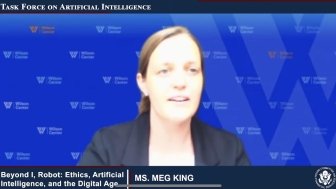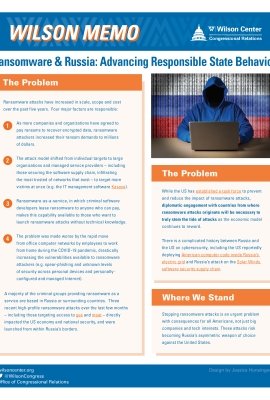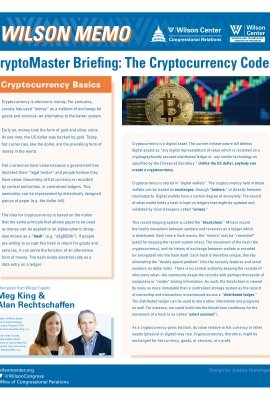Meg King
Former Director of the Science and Technology Innovation Program; Tech Labs Founder
Expert Bio
Summary
Meg King was the Director of the Science and Technology Innovation Program (STIP). She led a portfolio of transformational technology projects which focus on leveraging North America’s competitive advantages while improving security as well as analyzing policy challenges and opportunities posed by space-enabled critical infrastructure. King also led cutting-edge training programs to equip generations of Congressional and Executive branch staff with a better base of technology knowledge. A former Pentagon program manager and senior Congressional aide, King has written on topics ranging from cybersecurity to AI.
Full Bio
Meg King was the Science and Technology Innovation Program (STIP) Director at the Wilson Center. Previously, she was an international manager for the US Department of Defense’s Cooperative Threat Reduction Program. In that role, King developed the strategy for a new program in Sub-Saharan Africa established by the Office of the Secretary of Defense to address major digital and physical security gaps in high-risk facilities.
Until 2011, King was a senior staff member to the Chair of the House Homeland Security Subcommittee on Intelligence, Information Sharing, and Terrorism Risk Assessment. She negotiated introduction of the Protecting Cyberspace as a National Asset Act in the House. Key components of that bill became law in 2015. King also shepherded passage of the Reducing Over-classification Act, which President Barack Obama signed into law in 2010.
King was named one of the 40 under 40 think tank leaders by the University of Pennsylvania. She is a member of the International Institute for Strategic Studies and the Women in International Security Network.
Insight & Analysis by Meg King
Filter
- Blog post
- Science and Technology
Bringing Clarity to Cryptocurrency

- Publication
- Science and Technology
Broadening the Conversation around Facial Recognition: Lessons from the Consumer Perspective
- By
- Anne Bowser,
- Meg King,
- Alie Fordyce,
- and 1 more

- Blog post
- Science and Technology
Cybersecurity and AI: Three Security Concerns to Watch

- Video
- Artificial Intelligence
Meg King Testifies Before the House Financial Services Committee on Ethics, Artificial Intelligence, and the Digital Age

- Past event
- Science and Technology
AI and Allies in the Indo-Pacific: Enhancing Shared Security and Defense

- Publication
- Cybersecurity
Wilson Memo: Ransomware & Russia

- Publication
- Science and Technology
Wilson Memo: The Cryptocurrency Codex

- Past event
- Cybersecurity
Ransomware Everywhere: Advancing Responsible State Behavior in Cyberspace



